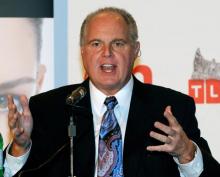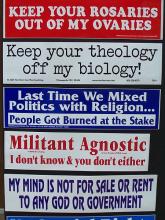Public Discourse
EVEN IF WE don’t spend our time listening to talk radio, most of us are aware that much of what passes for “discourse” on the airwaves these days is filled with vitriol and venom. But it wasn’t always that way. When I was growing up, radio commentator Paul Harvey was a regular background companion to our family’s dashed before-school breakfasts. Harvey, one of the precursors—but oh so different—to today’s shock jocks, offered a gentle heartland wisdom as he spun his daily stories, usually punctuated by a surprise ending and his signature line, “Now you know ... the rest of the story.”

Back in the 1970s, when I still was living near William F. Buckley in Switzerland close to my parent’s ministry, L’Abri Fellowship, from time to time the author would visit my mother and father for tea.
My late father (the theologian Francis Schaeffer) and Buckley had little in common apart from a shared love of art, the Swiss Alps, and a sense that the West was in a decline that only Christianity could reverse — even if they would not have agreed on what that word “Christianity” meant. WFB was a bon vivant Roman Catholic and Dad was a “biblical inerrancy” fundamentalist.
Dad would serve tea, but I could tell that, as the afternoons wore on, Buckley might have preferred an offer of something a bit “stiffer,” as the Brits call a real drink. Later, in the early '80s, Buckley and I were comparing notes about speaking (I’d just addressed the Southern Baptist convention before I fled the evangelical scene), and he mentioned that he agreed with Winston Churchill who said, "You can't make a speech on ice water."
Dad was a teetotaling Presbyterian. Notwithstanding, Buckley — perhaps to annoy my father — once said, rather pointedly, that he always demanded a couple of glasses of wine before taking to the podium.
When I learned of Gore Vidal’s passing Wednesday, I recalled Buckley talking to Dad and me about how Vidal and he used to go hammer-and-tongs arguing on TV — mostly on Buckley’s program Firing Line — only to go have a drink together after the show.

As I've read and listened to Christian reaction in the wake of Obama's interview stating his personal opinion on same-sex marriage, I've been discouraged with the nature and tenor of the conversation itself. Specifically, I'm troubled by the way many Christians choose to take definitive and certain stances about complex issues, and the rhetoric they use to state and defend these positions, rhetoric that tends to divide rather than unite and close discussion rather than open it.
I'm interested in exploring what it is about the Christian religion, and perhaps more specifically, evangelicalism that results in such an approach.
I fully understand the attractions of certainty. From my study of C. S. Lewis I know that his popularity among evangelical Christians in the 1940s and 1950s was largely due to his style of certitude. Lewis was writing in a time where scientific discoveries and religious liberalism were challenging the assertions of orthodox Christianity. In a period of doubt and questioning, Lewis seemed to have a way of cutting through complex arguments and reaching a simple solution that was convincing to his readers.

In an apparent bid to add an erudite contribution to our public discourse, Rush Limbaugh called a Georgetown law student a "slut" and a "prostitute" for testifying before Congress in favor of the Obama administration's mandate that employers cover contraception in their health insurance plans.
After a considerable public outcry, a number of sponsors have abandoned Limbaugh, causing him to issue what resembled a public apology. But Limbaugh also heard more than a few "amens" from people who considered difference of opinion a sufficient justification for publicly defaming the young woman.
Maybe I'm expecting way too much from talk radio, but don't we deserve better from our public discourse?
At the heart of this debate over contraception is a conflict between religious rights and social obligation -- one we've had to navigate numerous times in our nation's history.
It's never been easy for us to determine the boundaries between individual right to unencumbered belief and competing responsibility to civic need. But it certainly doesn't help us work through the difficulties when pundits resort to name-calling and complexities are dissolved into bumper-sticker sound bites.
To talk carefully about this tough issue requires that we take seriously the claim from some Catholics that a requirement to finance contraception represents a fundamental violation of convictions about when life begins and what makes sex a moral good. Yet we also need to take just as seriously the moral value that others place on the right of access to basic health services, and the public good that comes from including contraception in our definition of basic health care.

There are a lot of heinously unmerited personal attacks going on in these United States right now, but for some reason I’m most bothered by the ones against Dr. Katharine Hayhoe, a climate scientist and evangelical Christian. As this current Sojourners action alert describes, she’s been targeted by Rush Limbaugh, among others, for her efforts to speak the truth about global warming.
Partly, these attacks get under my skin because I’ve always had a soft spot in my heart for evangelical scientists. My dad is one, and my Intervarsity-linked Bible study in grad school was so full of them that, as often the lone humanities student, I jokingly made up a scientific discipline to fit in (“I’m in immunostatistics — I model atypical populations.”)
But mostly, the attacks on Hayhoe sadden me because she’s so genuine and earnest in her desire not just to convey the evidence for climate change, but also to engage in respectful dialogue.

When I talk about myself in relationship to atheists I often sound like a post-civil-rights white person trying to minimize the gap between myself and another group.
I don’t have anything personally against atheists.
Some of my best friends are atheists.
I even like Ricky Gervais. He’s an atheist, you know.
All of this aside, I have tried in vain over the years to understand atheism. I’ve written about it several times, and whenever I do, I get a bucket of responses from atheists.

Policy-Making Billionaires, Poverty In The Midst Of Plenty: Hunger Persists In The United States; The Religion Of An Increasingly Godless America (OPINION); Evangelicals Flocking Toward Newt Gingrich; Rev. Jackson Calls For New War On Poverty; Improving Social Justice Indicators Will Create A Better U.S. (OPINION); Is The Black Church The Answer To Liberal Prayers?; Catholic Charities' Human Trafficking Program Loses Federal Funds; Air Force Academy Adapts to Pagans, Druids, Witches and Wiccans.
People of faith -- including evangelical Christians -- will be voting both ways in the upcoming election. It is simply not true that they will be voting only on one or two issues.
And, if evangelicals focus on many of the issues central to their faith, rather than becoming partisan cheerleaders, they might be able to raise some critical issues in this election and to hold both sides more accountable, even in a campaign that both Richard and I suspect will be one of the ugliest in U.S. history.
At the end of the evening, Amy remarked that if the upcoming election debates were as civil and substantive as this evening was, we would all be very grateful.
Glenn Beck's exploitative event in Israel ignored justice and U.S. public opinion.
We have come to an impasse in the negotiations to raise the debt ceiling because of several conceptual errors in our public discourse. These errors were most glaring in the remarks recently delivered by Speaker of the House John Boehner in his response to President Obama. The largest conceptual error is the idea that the government of a constitutional representative democracy is different from the people. Boehner said, "You know I've always believed the bigger the government, the smaller the people."
What does this mean? The government is composed of the people, and if people are paying attention and voting according to their own interests, the government ought to work toward the happiness of the people. The problem is that too many Americans have bought into this conceptual error that the government is some kind of leviathan, a monster that exists to take away their liberties. This is nonsense. A correction of another conceptual error in Boehner's presentation makes my point.
Life is hard. It is full of pain, disappointments, and challenges of every kind. When hard times come our way, we often ask, Why me? And the answer comes: Why not you? We sometimes think that God has forsaken us, and sometimes God is silent. It is difficult to remember the Biblical wisdom that explains why believers, children of God, the beloved of God go through difficult times.
In Tucson, Arizona, President Obama spoke to the state of the nation's soul. Next Tuesday, January 25, he will speak to the state of the union.
On my way back to Pennsylvania after attending Jon Stewart's Rally to Restore Sanity in Washington, D.C. last Saturday, I couldn't get one sign out of my head which read, "It's too bad we even need a rally to restore SANITY."
Last week, I asked you all to tell FOX News that when it comes to truth and civility, they can do better. Thousands of you did. You aren't the only ones who see things getting worse than ever before. This week, a group of more than 130 former legislators, both Republicans and Democrats, released a letter urging for civility and encouraging candidates, once elected, to focus on cooperation to face our country's greatest challenges.